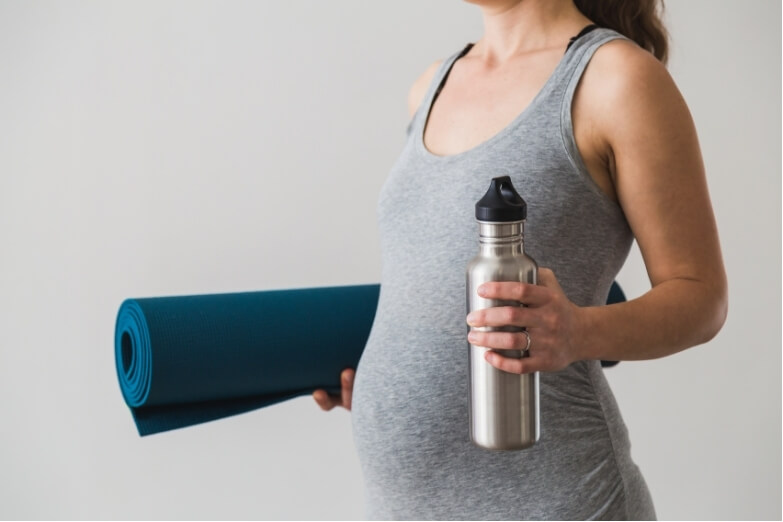Blog, Physiotherapy
How to Exercise Safely During Pregnancy: A Physiotherapist’s Tips

Hi I’m Kevin Go, a physiotherapist at M Physio – Spring Hill, Brisbane, with a strong focus on treating musculoskeletal conditions.
Throughout my career, I’ve been passionate in empowering patients to regain control of their health and improve their quality of life.
Today’s blog will focus on exercise and pregnancy.
Exercise During Pregnancy: A Guide to Staying Active and Healthy
Pregnancy is an exciting and transformative time, but it can also bring a lot of questions.
Many women wonder: Is exercise safe? How much should I do? And will it benefit me and my baby?
The good news is that exercise is not only safe for most women during pregnancy but also highly beneficial.
Whether you’re a fitness enthusiast or new to exercise, staying active can improve your health and well-being during this special time.
Why Exercise is Important During Pregnancy
Exercising regularly while pregnant offers numerous benefits. It helps reduce the risk of complications like gestational diabetes, high blood pressure, and the need for a caesarean section. It also alleviates common pregnancy discomforts such as back pain, pelvic pain, and urinary incontinence.
Beyond physical benefits, exercise boosts mood, reduces stress, and increases energy levels. It can also improve sleep quality, which is especially important during pregnancy. Staying active helps prepare your body for a smoother delivery and promotes faster recovery postpartum.
What Type of Exercise is Safe?
During pregnancy, it’s best to focus on low-impact and moderate-intensity exercises. Aerobic activities like walking, swimming, and stationary cycling are great options as they’re gentle on the joints and promote heart health.
Strength training is also beneficial as it helps maintain muscle strength, supports the changing body, and prepares you for the physical demands of labour. If you were strength training before pregnancy, it’s safe to continue at a modified intensity based on how your body feels.
Aim for 150 minutes of moderate-intensity aerobic activity each week—about 30 minutes a day, five days a week. If that feels too much, break it into smaller sessions.
Listen to Your Body
Exercise should always feel good. If you experience any of the following symptoms, stop immediately and consult your doctor:
- Painful contractions
- Shortness of breath
- Dizziness or headache
- Chest pain
- Calf pain or swelling
Avoid exercises that increase the risk of falls or injury, such as contact sports or activities on unstable surfaces.
Tips for Exercising Safely
- Choose low-impact, moderate-intensity exercises.
- Avoid lying flat on your back, especially in the later stages of pregnancy.
- Listen to your body—don’t push yourself too hard.
- Stay cool and avoid overheating.
- Don’t hold your breath during strength training.
Conclusion
Exercise during pregnancy is safe and beneficial for both you and your baby. Whether it’s walking, swimming, or strength training, staying active will help you feel better, reduce the risk of complications, and prepare your body for birth.
Always listen to your body, adjust your routine as needed, and consult your healthcare provider with any concerns.
If you’re unsure about which exercises are safe or how to adjust your routine during pregnancy, the qualified physiotherapists at M Physio can help. Reach out to us today at 1800 992 999.
 |
Written By:
Bachelor of Physiotherapy |
References
Artal, R. and O’Toole, M. (2003) ‘Guidelines of the American College of Obstetricians and Gynecologists for exercise during pregnancy and the postpartum period’, British Journal of Sports Medicine, 37(1), pp. 6–12.
Hinman, S.K. et al. (2015) ‘Exercise in pregnancy’, Sports Health: A Multidisciplinary Approach, 7(6), pp. 527–531.
MUDD, L.M. et al. (2013) ‘Health benefits of physical activity during pregnancy’, Medicine & Science in Sports & Exercise, 45(2), pp. 268–277.
Paulsen, C.P. et al. (2023) ‘The effects of exercise during pregnancy on gestational diabetes mellitus, preeclampsia, and spontaneous abortion among healthy women—a systematic review and meta-analysis’, International Journal of Environmental Research and Public Health, 20(12), p. 6069.


